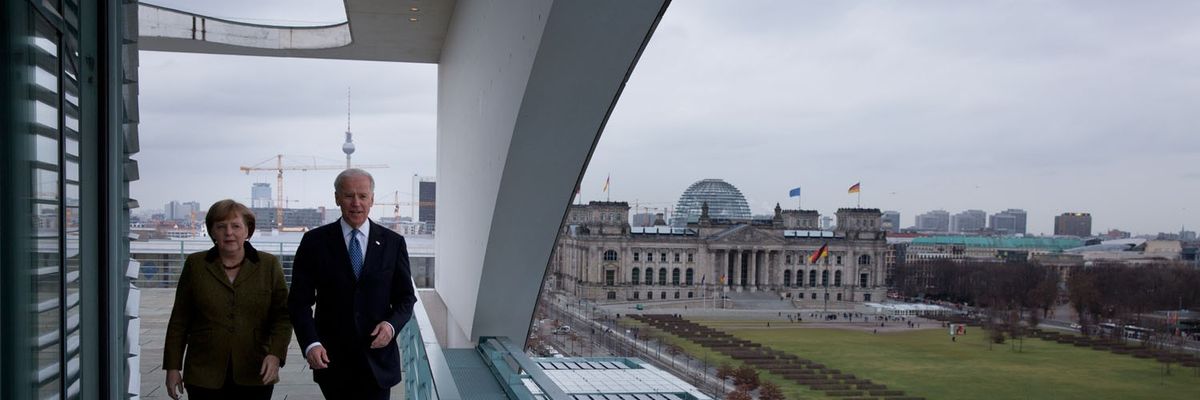The election of the nation’s first female vice president marks a political watershed in Washington, DC. And while President-elect Joe Biden and Vice President-elect Kamala Harris have promised a different kind of foreign policy, the real question about “building back better” is — how exactly, and for whom?
Who benefits? Whose interests will be taken into account? Whose voices will not be heard? Such are the questions that a feminist approach would ask of every policy. Some countries have already adopted a paradigmatic shift towards what is called “feminist foreign policy,” such as Sweden, Canada, France, and Mexico. And it’s time for the United States to follow suit, or even jumpstart refinements of the progressive approach.
Feminist foreign policy is rooted in a positive concept of peace and security that goes beyond the mere absence of war. It includes dimensions of “human security” such as equitable and sustainable development as well as social cohesion. Moreover, it is about inclusive decision-making representing all those impacted by the results — not only because it is right, but also because it produces better outcomes. Therefore, diversity and gender equality are core pillars of the concept. This ultimately requires an assessment of a given policy’s gendered impact on indicators such as political participation, employment and education opportunities, or specifics such as gender-based violence.
Comprehensively implementing a feminist foreign policy requires paradigmatic shifts in how policy making is thought of and conducted. However, even before any full-fledged policy overhaul, a feminist approach allows for better decision-making. Because, simply put, more diversity in decision-making leads to better decisions — including in matters of national security far away from any idealist setting.
In a recent paper, we have demonstrated why a feminist approach can help devise better policies even when dealing with a oppressive regime such as Iran’s. Because feminist foreign policy begins with critical self-reflection and has nothing to do with going ‘soft’ on the other (a term that is in itself gendered, as ‘hard’ is often considered to have masculine qualities) but allows for a more complete picture of the challenges ahead. With a broad understanding of security, by decoding (international) power relations, and by recognizing the political agency of women and other marginalized groups, it offers a more effective and sustainable approach.
The incoming Biden administration would be well-advised to look at the challenges posed by the Islamic Republic in the long term. “Maximum pressure” has arguably only led to escalation across the board, whether on the nuclear program or on Iran’s regional posture. While the first months of 2021 offer a small window of opportunity for a ‘compliance-for-compliance’ deal to halt the downward spiral, the real test comes with recalibrating U.S.-Iran relations: from establishing lines of communication and confidence-building to eventually using negotiations to make the deal stronger.
Here, feminist foreign policy, as we understand it, offers tangible benefits with a three-pronged strategy centered on broadening the approach, increasing the diversity in decision-making, and engaging civil society.
A broad and regional approach looks beyond the nuclear file and Iran and considers the human security needs of Iranians, their Arab neighbors, Israel and other countries in conjunction. This would allow for immediate humanitarian gestures in the face of the pandemic, which would help build trust where there is little going around. Maritime security, environmental degradation, and even nuclear safety — with soon three civilian nuclear programs active around the Persian Gulf — are areas ripe for technical cooperation that can pave the way for enhanced political dialogue.
Diversity starts at home, by decreasing the barriers to representation and participation of women and other marginalized groups in U.S. foreign policy making. On top of promoting diversity in numbers, this requires cultural change to overcome a gender-stereotypical security discourse that inherently limits policy options. As Rep. Jackie Speier, Co-Chair of the Democratic Women’s Caucus, said when tabling a resolution calling for the adoption of a feminist foreign policy this September, such a whole-of-government approach requires “a commitment to diversity and gender parity in hiring and promotion in the national security and foreign policy sectors”.
Finally, strengthening and working with civil society means to include civic actors, such as Iranian or American women’s networks, in the development of Iran-specific or regional strategies. Their expertise can help develop smart policy options to support women without attaching a feminist label, for example through economic empowerment in the service sector and of small and medium-sized enterprises, or through environmental protection programs. Here, obviously, the United States can work closely with its European partners, some of which also have in-depth experience — both good and bad — with human rights dialogues with Iran.
A return to transatlantic cooperation would obviously be a good thing, as the United States and Europe have only been successful on Iran policy when working together. However, this cannot simply mean to turn-back the clock four years and pick up where the two sides left. Importantly, the Democratic Party’s platform promises to “prioritize nuclear diplomacy, de-escalation, and regional dialogue“ when it comes to Iran, while making “gender equality a key foreign policy priority and [working] to achieve gender parity across our national security team.” The former chimes well with the Europeans’ long-standing approach on Iran, and the latter echoes the European Parliament’s recent call to develop a European feminist foreign policy.
As dire as the situation looks on the ground and vexed as the issues around Iran are — this is the moment for both Washington and European capitals to rethink their foreign policies and the Islamic Republic is indeed a good case to start implementing a feminist approach.

















